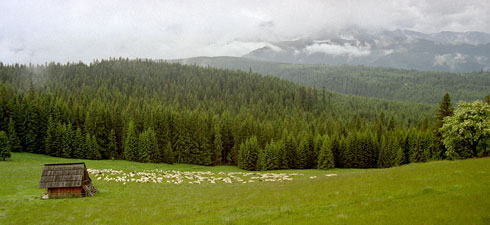Even if you took a close look at the posters with their hollow sounding slogans, you might not realise that there was going to be a general election on 12 June. You could just as well conclude that they were part of an advertising campaign for washing powder or mortgage loans. In spite of a tense political context, which has recently been marked by sparring with Hungary and a number of corruption scandals, polls predict that voter turnout will be no more than 50%. Why is it that so few Slovaks bother to vote? Don't they realise that this is precisely the kind of attitude which weakens democracy? The truth is that in many places in Slovakia, these kinds of considerations do not have any real meaning.
"I wasn't unhappy under the communists"
When you take the road that heads east from Bratislava, you are travel back to another era. The towns become few and far between. The mountains loom over unfinished sections of road that branch off the motorway, and the environment assumes a wholly different aesthetic as the ostentatious villas and luxury cars slowly disappear to be replaced by a landscape where there is a sense of a much greater harmony with nature. After about four hours, you come to the Muráň Plateau, where time seems to be governed by a completely different set of rules. Night falls unexpectedly early, especially in the village of Muránska Zdychava, which is set in a deep narrow valley that is dark in winter, and drowned in shade in summer. And sunlight is not the only absence in the village, which has never really been affected by politics, not even in communist times.
We found Jan Siman (age 63) sitting in the village tavern with five other men dressed in overalls thick sweaters and heavy boots. "I wasn't unhappy under the communists, and I'm not unhappy today either," he announces cautiously. "I don't need much in life: just a few cows, a horse and a roof over my head." Ever since the Vlachs who settled here in the 16th century were granted the right not to pay income tax, regional independence with regard to the state government has been a strong local tradition. And this also applies to the current democratic regime.
Not bothered looking for work
This is a village where people have little time for political considerations, which have hardly any bearing on their daily lives. In the streets, you can still see the remnants of posters for politicians who campaigned in 2006, and now there is yet another election. "I'm not going to vote for anyone. I don't see the point, they are all the same," says Siman. "And I don't know anyone who is planning to vote." And his attitude is not really surprising. Bratislava appears so far away. Even Frankfurt, which is where they administer the euro — by the way in case you are wondering, one euro buys two beers in the tavern — seems much closer to home.
Ever since the economic crisis put an end to his job in a local magnesium mine where he ruined his lungs, Guliarik (age 45) has not bothered looking for work, even though he has been unemployed for more than a year. "I don't want anything from the state, just as long as they give me my 150 euros dole money," he says. That is enough to buy bread and alcohol from the village shop. All of his other needs are taken care by produce from the 20-hectare field he inherited from his father.
Is Slovakia a functioning democracy?
When we point out that with a holding of 20 hectares, he could be entitled to up to 5,000 euros of European farm subsidies, and that he only has to file an application and mow the field regularly… He takes a moment to think and shakes his head: "No, I don't want any of that. I mow the field because I need the hay. I don't want to waste time with the authorities, and have to put up with their inspections. And then I'd have to pay taxes. What would be the point in that? Just so they could send my money to the Greeks?" Guliarik does not have electricity or a television, but he does have a mobile phone. And there is nothing that he needs to know that he doesn't know already. "I'm not going to vote for those robbers. And as far as the European Union is concerned, I don't give a damn. In any case, it's going to fall apart just like the communist system did. Things always end up falling apart."
When you speak to these mountain people, they seem alienated from the Slovak political nation to the point where you wonder if we are really living in a state with a functioning democracy. Slovakia is a country where the natural boundaries of rivers, mountains and deep valleys have establish clear divisions between different regions, where local identity prevails. But a short walk from the tavern, you can still find reason to believe in a political nation that is worth defending in the shape of modest stone monument remembering two partisans, who died fighting the Germans in 1944. But that was more than 60 years ago. Since then nothing has happened to make the region of Gemer, which has the highest rate of unemployment in Slovakia (close to 30%) and the lowest voter turnouts in the country, take an interest in history with a capital "H".
Elections
A political puzzle
After four years of coalition between Prime Minister Robert Fico's social-democrats and the far-right Slovak National Party, voters going to the polls on 12 June will likely be mulling over the many contradictions that prevail in Slovakia. Czech daily Hospodářské Noviny notes that the country "succeeded in joining the eurozone, but has now been marked down in rankings published by international organisations that evaulate political corruption." And although, it proved to be "relatively resistant to the economic crisis, the country now has the highest rate of long term unemployment in the OECD." At the same time, any praise for Slovakia's "success in establishing strong non-governmental organisations" will have to be tempered by an acknowledgement of the negative impact of "harsh legislation that penalises the media for criticising politicians."
Campaigns which focused on tensions with Hungary and the Hungarian minority in Slovakia, as well as the economic crisis and a number of corruption scandals, have made little impact in the country's media. According to the latest polls, Fico's party will be the likely election winner, but will have trouble finding an appropriate coalition partner.











